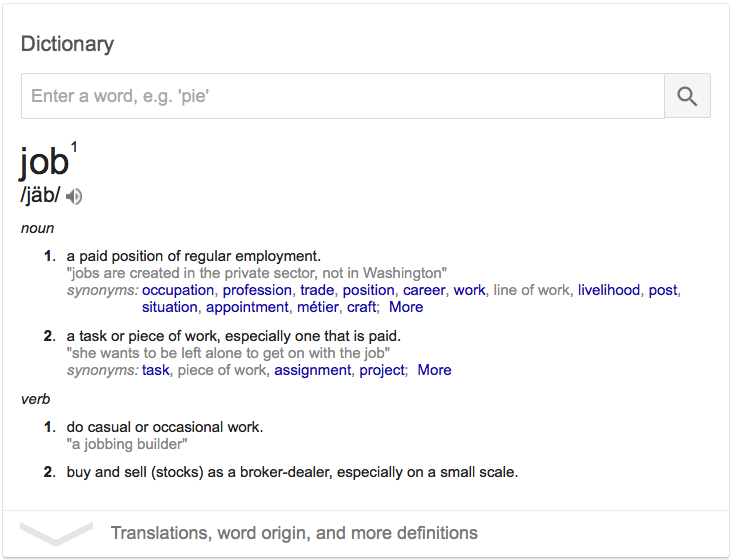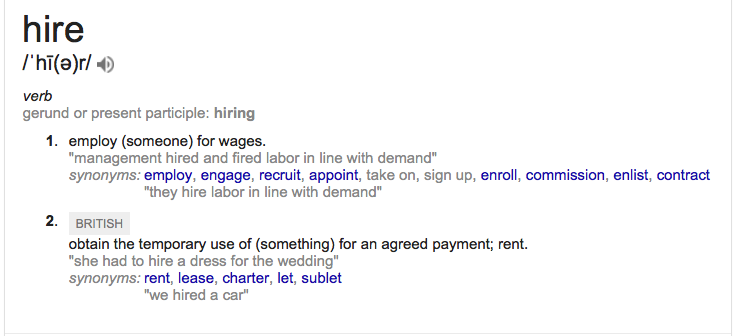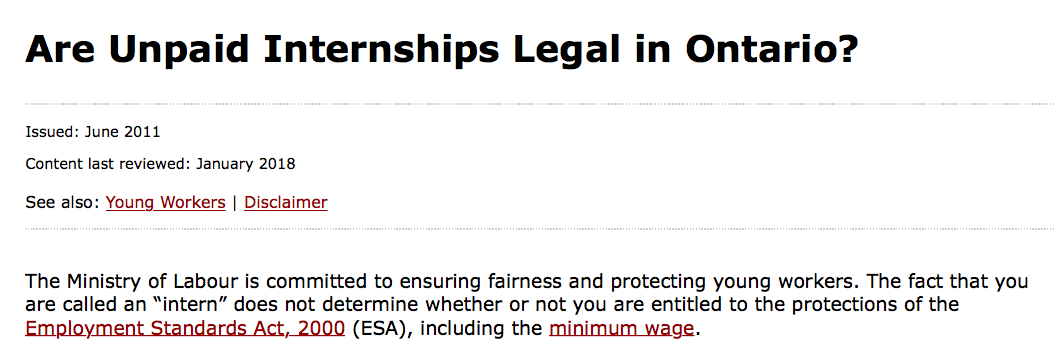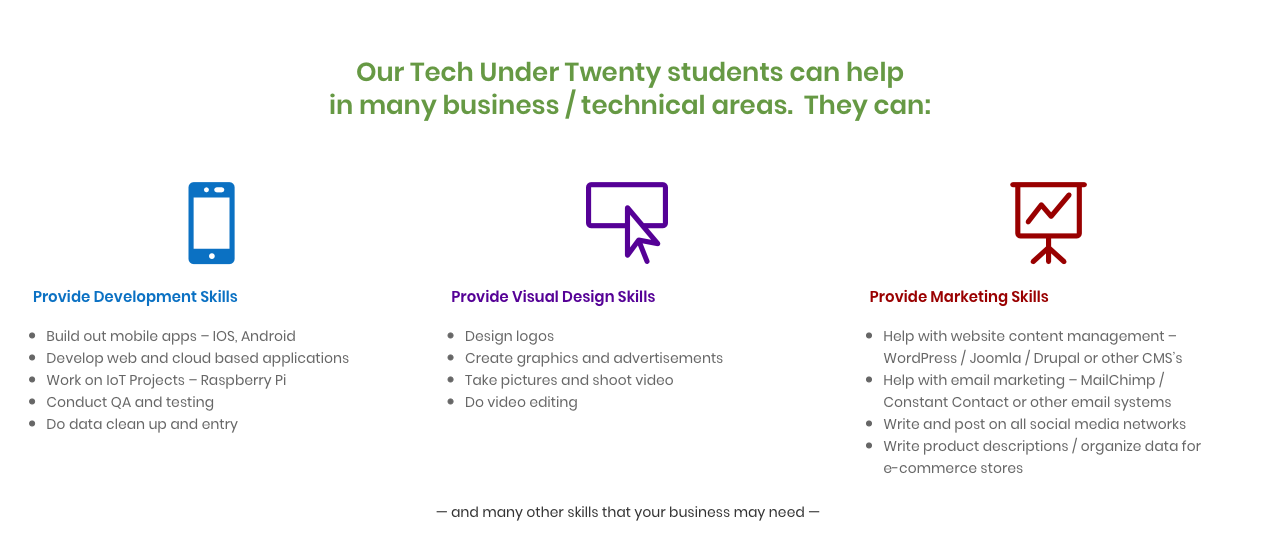It still boggles my mind how often people, especially young people, ask this question. Maybe the word has changed its meaning in the past couple of years, let me check.

Ok, looks like it still means the same thing, a paid task of work.
So why do young people believe that jobs can be unpaid?
Language used
I quickly browsed through the U of T Facebook group and saw some recruiting posters for student groups. Here are some:



Hiring, hiring, hiring and hiring!
(To be fair I didn’t include the ones that didn’t have the word hiring in them and I’ll explain why.)
Are these paid positions… no. So they are hiring for unpaid positions… yes.
So what does it mean to hire someone?

Employ someone for wages…
Are we noticing a trend here? 4/9 posts for student groups I saw talked about hiring people, which by the true definition they were not. So why are students perpetuating a misunderstanding of a word? Easy, it gets people’s attention.
There are hundreds of clubs at U of T, thousands of clubs to get involved in general. You need to cut through the noise. You need to get the best. But, you don’t have money. The easy answer is to have people stop doing it.
“But Denys, if I stop I’m going to lose out to the club down the door that doesn’t take the moral high ground”
Sure, but if you are trying to “facilitate social change” and “improve the lives of students,” shouldn’t you focus on being ethical and transparent with your message? Or is it just a resume builder?
That was a little harsh, I’d argue most people aren’t being sinister or even realizing the language they are using can be misleading. They just want to get some excited people to work with them!
So what now, do we report people who use the wrong words, do we turn into the language police? No, but we should be careful in establishing non-standard definitions for words, especially for younger people and people who have not been exposed to the working world for long.
ATM Machines

Why is there a picture of an ATM machine?
Do you see anything wrong with the phrase ATM machine? Look closely ATM = Automatic Teller Machine. Automatic Teller Machine Machine. That seems redundant, doesn’t it?
How about the phrase “paid internship.”
Let’s take a look at the definition of an internship on the Ontario labour website.

So, unpaid internships are … illegal*. I repeat unpaid are illegal*
Digging a little deeper we can find an article by Law firm McMillan LLP with the following remarks:
“Unpaid internships are impermissible in Ontario unless the internship falls under one of the three narrowly construed exemptions listed in the ESA”
1) Internships that are part of a program approved by a secondary school board, college, or university;
2) Internships that provide training for certain enumerated professions, including architecture, law, public accounting, veterinary science, dentistry, and optometry; and
3) Internships that meet the six conditions required for the intern to be considered a “trainee”.
So unless you fall under these categories you should be getting paid. End of story.

The third category specifies that the internship is essentially training with the employer gaining no benefit from “employing” you. So let’s go through to see if thee apply to you
- The training is similar to that which is given in a vocational school;
This does not apply to most people, most of the internships I’ve heard of are white collar.
- The training is for the benefit of the individual;
This probably applies to everyone, an internship is great for learning!
- The person providing the training derives little, if any, benefit from the activity of the individual while he or she is being trained;
Ask yourself the question, is the employer who is providing you with an unpaid internship benefiting in any way?
- The individual does not displace employees of the person providing the training;
Are you doing the job of someone else who was previously employed?
- The individual is not accorded a right to become an employee of the person providing the training; and
Are you told you won’t become an employee after?
- The individual is advised that he or she will receive no renumeration for the time that he or she spends in training.
Are you told you will not be getting paid?
Please note that I am not a lawyer and am not providing legal advice. If you are looking for legal advice please consult a real lawyer.
…
So tally up your score and see what you got. Probably a 3 or 4? That’s 50-66%, so it’s ok to not get paid?
Nope!
If any of the above conditions are not fulfilled, you cannot have an unpaid internship. End of story.
So why do people still take unpaid internships?
They are scared.
“You need experience to get a job, but you need a job to get experience! I’m just going to work this internship to get enough experience to get a real job or get my foot through the door”
This is a fair concern. We’ve been told for years how competitive it is to get a job and how difficult it is to stand out. In many cases, it is very difficult to get a job. But it’s not a good idea to set precedent that students are willing to work for free as companies profit.


They want to learn.
Internships, on the job training and co-ops are a great way to learn skills needed for the workforce. Schools often fail to provide skills to students, and students feel the responsibility to learn on their own. Fair.
But then employers should not call it an internship. Call it a mentorship program. A training program. A fetch-me-a-coffee program. It should be very transparent on what the agreement is between the student and employer. No hiding behind words.
They don’t want to miss out.
Imagine after interviewing you are told this is an unpaid position. What would you do? Would you still take the job, get the experience, get the skills and add it to your resume.
Say you are brave enough to ask the employer why they can’t pay you and they respond with: “We don’t have it in our budget” or “we’ll go out of business”. If this is the response, start asking questions about how this company makes money. Is it because they use unpaid labor to run their company? If so, they should find a new business model, or move to a country that allows sweatshops.

For employers
So it may seem like I’m potentially bash employers who want to help, but can’t afford to, like a small family business. I’m not. I want to make it clear that you understand how students feel and how you should be very clear with the opportunities you are providing. Taking the time to work with students is a huge opportunity cost, and internships are often a net loss for a company in terms of sunk costs by the intern’s boss, coworkers and other expenses. So let’s take a look on how to improve your student outreach program.
Be very clear with what you are offering.
Please don’t play lawyer and be vague, be transparent to students. We’re young, we’re used to reading class assignments which are usually straightforward. We’re smart but don’t make it more difficult than it has to be.
Find other ways to help students
Volunteer to teach a workshop on a key job skill. Have a job shadowing day. Be a mentor. Share some resources with students that would help them in the future. Organize.
Re-evaluate your student program
Think about what your interns are doing now? Are they maximizing their learning or getting coffee? Are they living up to their potential? It is difficult to trust a student to work on your business-critical applications, but there can be a lot of value on nice to have projects.
I’ve heard many stories of students sitting around without much to do because their bosses didn’t give them enough work or challenging work. If a student is capable of doing bigger things, challenge them!
Find unique things students can do?
Don’t have a social media presence? A student can probably help you out!
Don’t have a website? A student can help you out!
Want to redesign your logo but don’t have the artistic talent? (You know what the answer is)
45% of small businesses have no website according to a 2017 CNBC and SurveyMonkey study which means that there is still a huge opportunity to add value to your business. Young people know the digital world, be open to letting them help you! It doesn’t have to be full time work. If you are paying a student minimum wage to update your social media for 5 hours a week and is a million times better than having them as an unpaid intern!
So where do we go from here?
Unpaid internships still exist, students still want experience and employers won’t implement student programs all at once.
For students
Approach local businesses and ask how you can help. More often or not they will admire your forward approach and there are probably some skills you can offer for paid work.
Go to local meetups and events. Eventbrite and meetup.com are great to finding places to learn about the things that interest you! AI, marketing, finance, lots to explore! If you’re into tech, TechToronto is a great place to start.
Join a student group focused on these things. In Toronto there are a number of clubs, groups and organizations to help you out. To give you a few leads you can checkout Toronto Hacker Club, TKS or Toronto Youth Network. There are many more, these are just some I’ve come across.
If you are in Halton Region, TU20 is the place to be. We have school programs, competitions and workshops to help you out! Our next event is Learn2GetHired (oh) where we help you understand the tips and tricks of getting a job and bring in employers who are ready to hire you. We have some more information here.
And if none of these things match your interests, start your group! Just make sure to not say you are hiring people, unless you are paying them ;).
For Employers
Be open to hiring students are volunteering your time. You can have an immense impact on a student’s life by hiring them for a paid summer position or being their mentor.
If you are looking to hire students, we have our TU20 Learn2GetHired program coming up soon. We’re expecting 50 students who are eager to help out with your business and are looking for paid opportunities.
In the past, students have helped with marketing, app development, graphic design, and more!

Wrap up
Some key ideas I want everyone to take away from this today:
As a student:
- Know your options and rights when looking for a summer job
- Be outgoing and creative on how you can help businesses out
- Seek out opportunities that can help you
As an employer:
- Be clear with students on what you are offering and don’t rely on free labour.
- Think of alternate ways you can help students. It really makes a difference.
- Be creative about how students can help grow your business.

Denys Linkov
TU20 Lead | 3rd Year U of T CS
Denys is passionate about solving real world problems with technology, including making work and education more enjoyable, productive and easier to access. He is a third year student at the University of Toronto studying Computer Science and Employment Relations.
